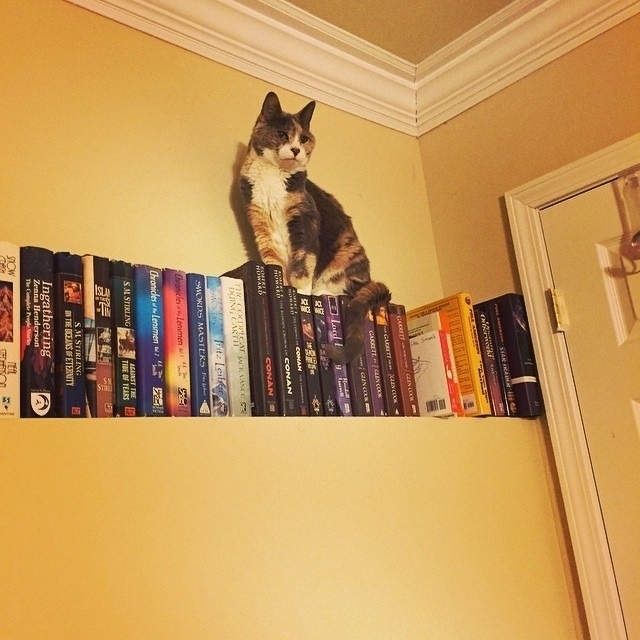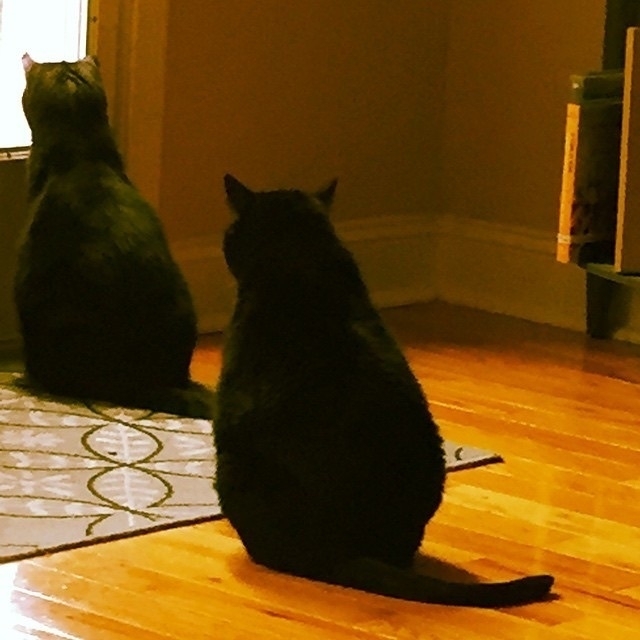If I see farther, it is because I stand on the shoulders of giants. - Academicat

Patiently waiting for turn at Cat TV.

THEOLOGY AND BBT
The Big Bang Theory: From Caricature to Complexity (Peter Augustine Lawler): “The Big Bang Theory ultimately points to the limited but real wisdom that comes from understanding two partial truths—that of the personal, judgmental, loving God and also that of the ‘God of nature’ the scientists seek to understand. The show leads us to think about how to put together the two explanations of ‘the Big Bang’—one based on faith in a personal Creator and one based on scientific discovery of the impersonal laws of nature—to account truthfully for both nature and human nature.”
ELIXIR VITAE
“Caffeine is the most widely consumed psychoactive substance in the world.” And a non-trivial evidence of benevolent Providence!
via How Caffeine Evolved to Help Plants Survive and Help People Wake Up - NYTimes.com.
LAPTOPS IN THE CLASSROOM
resistance is futile, part zillion - Text Patterns - The New Atlantis: “My students are in class with me for two-and-a-half hours, 150 minutes, per week. During those 150 minutes I choose to focus on our using, together, the technology of the codex.”
Alan Jacobs hits the spot on why professors ban laptops (and presumably, tablets) in the classroom. I may be considering this for the future, especially when it’s combined with that research showing that note taking goes better in handwriting.
IN PRAISE OF COFFEE
Coffee is the very beverage of the people of God, and the cordial of his servants who thirst for wisdom. When coffee is infused into the bowl, it exhales the odor of musk, and is of the color of ink. The truth is not known except to the wise who drink it from the foaming coffee cup. God has deprived fools of coffee, who with invincible obstinacy condemn its use as injurious. -- Journal of the Transylvanian Medical Society, 1834
THE RISE OF THE HELICOPTER TEACHER

Teaching and parenting share this in common: In both relationships, the goal is to produce independent and self-sufficient human beings. The risk that helicopter parents run is that they will raise children so coddled that they have a hard time functioning on their own in the larger world. So too with the way we have infantilized our students. Afraid or unwilling to challenge them, we pass them through with perfectly good grades but without much of a sense of how to work on their own or think for themselves. – The Rise of the Helicopter TeacherJust to be fair, here’s an acknowledgement that helicopter teaching is also a thing to avoid. Every vocation has its pitfalls.
ONE FOR THE PARENTS DROPPING CHILDREN OFF AT COLLEGE THIS WEEKEND

Bye-Bye Birdies: Sending The Kids Away to College - Tenured Radical - The Chronicle of Higher Education: “many faculty see behavior in students (particularly absenteeism, lateness, disorganization and requests for special arrangements) as irresponsible, lazy, dishonest and immature, when in fact students are living, and making decisions, in ways that make complete sense to them and to their parents. So without further ado, here are things you can do as a parent to make your kid a strong and independent college student."In short, don’t be helicopter parents! (In fairness, K-12 practices do seem to encourage this but college is not Grade 13.)
ST. BENEDICT RETROSPECTIVE
Yesterday was St. Benedict’s day; it’s the second of two, as his proper day is March 21st, but June 11th has also long been celebrated.  Three monks made simple vows and that’s always a fine moment for the college as well as the monastery.
Three monks made simple vows and that’s always a fine moment for the college as well as the monastery.
In the spirit of the day, here’s a reflection on Benedict the saint from Benedict the pope emeritus.
A cat with the right idea. Good night!

ODYSSEUS AND THE LIBERAL ARTS?
Odysseus: Patron Hero of the Liberal Arts: "So how will I present this illiterate pagan Odysseus, a man, moreover, with the additional disadvantage of being a fiction, as the patron saint of liberal arts, the arts of interpretation?"Since Eva Brann is asking the question, her answer is more than worth hearing. TLDR; if we cannot interpret our own lives, they will be interpreted for us by others. And in that case, why bother living?
WEEKLY READING - HERODOTUS
Fresh out of Guardian columns, but here’s this week’s reading nonetheless. Just wound up the new translation of Herodotus’s The Histories, by Tom Holland. It’s a fine version, although idiomatically modern in many places. But that does serve to make the text more immediate, and probably more like what the initial audience in Athens would have heard. Highly recommended, and much better than getting your Thermopylae by way of Frank Miller.
NOTE FOR THE FOURTH OF JULY
The twentieth century was one in which limits on state power were removed in order to let the intellectuals run with the ball, and they screwed everything up and turned the century into an abattoir. We Americans are the only ones who didn't get creamed at some point during all of this. We are free and prosperous because we have inherited political and value systems fabricated by a particular set of eighteenth-century intellectuals who happened to get it right. But we have lost touch with those intellectuals.
– Neal Stephenson
WEEKLY READING - SPINOZA
And now to the last of the Guardian weekly readings posts, with a look at Spinoza. There’s an odd resemblance to Calvin, at least in my personal pantheon, that would have horrified both of them. Each is a beautifully structured thinker, in a very admirable way, but one that I just can’t follow along with.
The particular thing about Spinoza is the recent vogue in attributing the entire foundation of the modern world to him, exemplified in a whole series of things by Jonathan Israel.
- Part 1: Philosophy as a way of life
- Part 2: Miracles and God’s will
- Part 3: What God is not
- Part 4: All there is, is God
- Part 5: On human nature
- Part 6: Understanding the emotions
- Part 7: On the ethics of the self
- Part 8: Reading the Ethics
When I was reading him in grad school, there were various editions but they all seem to have been superseded by the Hackett Complete Works. The biography to read is Nadler’s.
COMPUTERS: YES, BUT...
“Computers are great, and I not only encourage their use by my students, I try to teach students how to use computers better. But for about three hours a week, we set the computers aside and look at books. It’s not so great a sacrifice.” – Alan Jacobs, Laptops of the BorgI’m thinking more and more about a similar policy for the Fall; check out the post for some of the classroom-use considerations, on top of the handwritten notes point that I blogged earlier.
799 YEARS AGO TODAY
No free man shall be seized or imprisoned, or stripped of his rights or possessions, or outlawed or exiled, or deprived of his standing in any other way, nor will we proceed with force against him, or send others to do so, except by the lawful judgement of his equals or by the law of the land. To no one will we sell, to no one deny or delay right or justice.
– Magna Carta, 15 June 1215.
INSIGHT INTO VATICAN POLITICS
Francis Cleans House at Vatican’s Financial Watchdog: “By reforming the Church, Francis is doing more than serving his flock. He is making a contribution to the well-being of people of all faiths and no faith all over the world."
One of the political blogs I follow has the habit of occasionally venturing into theology; surprised to see this today about a bit of Vatican inside baseball.
THE GENERAL...
The general who advances without coveting fame and retreats without fearing disgrace, whose only thought is to protect his country and do good service for his sovereign, is the jewel of the kingdom.
– Sun Tzu
WEEKLY READING - PLATO
When I started studying political philosophy in graduate school, the emphasis was on the classics and above all, Plato. Augustine, the Church Fathers, and Bonaventure only kept reinforcing this as I got farther and farther into theology. Here Mark Vernon gives a fair rundown on how Plato somehow stands across Western thinking.
- Part 1: Why Plato?
- Part 2: Who was Plato’s Socrates?
- Part 3: Philosophy as a way of life
- Part 4: What do you love?
- Part 5: Love and the perception of forms
- Part 6: The philosophical school
- Part 7: Plato and Christianity
- Part 8: A man for all seasons
Plato: a very short introduction will give you more, as will Stanford (Web), but the more important thing to grasp about any ancient philosopher is that they’re pursuing a way of life. Then you could consider the Republic or even the Complete Works in tandem with Plato’s Philosophers: The Coherence of the Dialogues, which is one of the few texts I’ve found that covers all the dialogues.
WEEKLY READING - CALVIN
I’ve been looking forward to this, since despite being a Catholic theologian who’s firmly convinced that double predestination is a horrible blasphemy, I’ve always admired Calvin as a theologian. The sheer architectural brilliance and comprehensive nature of his thought inspires a kind of intellectual awe. If I had landed at a Reformed college rather than a Catholic one (Deo gratias), I could easily have wound up a Calvinist.
In belated commemoration of his deathiversary (May 27, 1564), here’s the Weekly Reader on John Calvin. We’re still working through these sets of Guardian posts on various thinkers (Plato and Spinoza to go).
In their choice of writer, the newspaper really rolled sixes with Paul Helm (Helm’s Deep), who’s one of the best bloggers on the wider Reformed tradition as well as the writer of an amazing Calvin book.
- Part 1: A world figure
- Part 2: A practical theology
- Part 3: Knowledge of God and of ourselves
- Part 4: Word and Spirit
- Part 5: Predestination
- Part 6: The world
- Part 7: Heresy and death
- Part 8: The legacy
For the truly brave, of course, there’s no substitute for Calvin himself. Institutes of the Christian Religion is his Summa, although as it’s two thick volumes, the bravery will definitely be required.
MASONS & CATHOLICS, NO MONTY PYTHON
“Indeed, much of European and American politics over the past two centuries has involved a running and often bitter confrontation between Masons and Catholics. Why is that?"
Follow the link to see why, as Philip Jenkins continues his discussion. It also shows how much, perhaps, of the past had to be forgotten to reach our more ecumenical age. I’m sure the reporter who asked me about this was expecting to hear that there was no problem any more.
And indeed, in the United States, there probably would not be. But how much of that would simply be due to not taking these things as seriously as our forebears did, rather than actual growth in understanding?
WEEKLY READING - AQUINAS
When I was in elementary school, I vaguely remember something called the Weekly Reader that functioned like a newspaper for children. A lot of water and a great many books have gone under the bridge since then, but I thought a Weekly Reading post might be fun to keep up.
The Guardian has a whole series going on major thinkers, and we’ll be reviewing what they have to say on Calvin, Plato, and Spinoza before we’re through. After that, it’ll be far enough into the summer to have some of my own reading built up.
But first, Thomas Aquinas!  The following columns by Tina Beattie do a good job on the basics of his outlook. I wouldn’t normally think to find this in the Guardian, but they’re being honest brokers.
The following columns by Tina Beattie do a good job on the basics of his outlook. I wouldn’t normally think to find this in the Guardian, but they’re being honest brokers.
- Part 1: Rediscovering a father of modernity
- Part 2: The mind as soul
- Part 3: Scripture, reason, and the being of God
- Part 4: How did the world begin
- Part 5: What does it mean to be human?
- Part 6: Natural law
- Part 7: The question of evil
- Part 8: Thomas for today
- Chesterton, The Dumb Ox
- Penguin Classics, Selected Writings
- Bauerschmidt, Holy Teaching: Introducing the Summa Theologiae of St. Thomas Aquinas
ODD COMBO: FREEMASONRY, MONTY PYTHON, CATHOLICISM
“You absolutely cannot understand the British Empire without masonry”
Monty Python was right!
But still interesting; I’m going to look forward to the next few posts along these lines. Always admired Philip Jenkins’s scholarship.
Ironically, a few years ago, a reporter asked me about the prohibition against Catholics becoming Masons. I’d thought it had dropped out, but it turned out that it’s still in force.
[youtube [www.youtube.com/watch](http://www.youtube.com/watch?v=ddM7kJ9xQfA])
HOW I FEEL AT THE END OF THE ACADEMIC YEAR (H/T PROFESSOR WAGSTAFF)
Some day, Faculty Assembly, some day…
[youtube www.youtube.com/watch
MOLESKINE OVER MACBOOK FTW
Why students using laptops learn less in class even when they really are taking notes
"Writing by hand activates the brain in ways that typing doesn’t to improve learning."
Always thought this was true; nice to have some evidence to back it up. Even better: it’s an argument for banning the laptops in class! But then that assumes that student longhand is good enough to keep up…
UPDATE: If you like the idea, here’s a set of Moleskine notebooks at Amazon.
AND JESUS SAID TO SIMON...
And Jesus said to Simon, Son of Jonah B.A. (Philosophy, Oxford), ‘Who do you say that I am?’ And he replied, ‘Given a) the probability that God exists, that is, given fine-tuning, the kalam cosmological argument and the low probability of atheism being true given the modal form of the ontological argument, and given b) the compatibility of incarnation with the prescriptions of Perfect Being theology and given c) the apparently inexplicable things you’re reported to have done (though, given that this is early in your ministry, ideally I’d need to see a few more), and given d) defeaters to the counter-argument from the Biblically defined role of the Messiah, I’d guesstimate that, on a Bayesian account, there is a conditional probability of at least 0.7 that you are in fact the Messiah. At the same time, of course, I should acknowledge that there is a corresponding probability of 0.3 that you aren’t.’ And Jesus responded, “Blessed be you, son of Jonah BA (Oxon). On this rock I shall build my church!”
Alan J. Torrance, “Analytic Theology and the Reconciled Mind”
More complicated but also funnier than saying, Non in dialectica complacuit Deo salvum facere populum suum.
Pre-movie tea!

